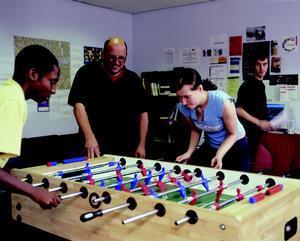Scenes like this are dotted through Mark's day – and prove an accurate his description of the job of a hostel worker as a cross between "key worker, careers adviser, youth club leader, admin worker and bank teller".
Like other Centrepoint hostels, the Vauxhall Cross centre houses 26 homeless 16 to 25-year-olds. It mixes those who are almost ready to move into their own flats with those tackling serious drug problems – residents are all former rough sleepers referred to the hostel by contact and assessment teams, and have a drug or alcohol problem, mental or physical health needs, or learning difficulties. There are usually 20 young men and six to eight women. The hostel also has drugs and mental health workers. Mark's role is to help the young people gain self-esteem, enroll on courses or start jobs and move on to hostels where the support is less intense, or to their own flat with a support worker.
His day kicks off with a 10am staff meeting to discuss the hostel's life skills service. Mark and his colleagues discuss the effectiveness of the courses and leisure activities, gaps in service provision and projects at other hostels that could be copied by Centrepoint.
About once a month, Mark misses the meeting to collect the hostel's petty cash from Centrepoint's central office. After filling in forms, he takes the money to the bank, catches the Tube to Vauxhall and gets back to the hostel at 11am. The next three hours are spent on paperwork, filling in assessments of the residents' use of the facilities and updating the project's accounts. "Admin takes a lot of time which could be spent doing things with young people," he says.
After a short lunch break, he updates each resident's key worker on any concerns which the young people have made to him. Although each resident has a key worker, some would rather talk to Mark informally. Later, he takes a group of residents to a local bowling alley.
"To do this job you need the wisdom of Solomon and the patience of Job," laughs Mark, who started working at Centrepoint because he could "offer more choices for people than getting back into crime or drugs". "You've got to be patient with the residents and the organisation. If you went into this without much experience, you'd be pulled all over the place. Young people can be good at exploiting other people." As well as patience and a sense of humour, Mark has a no-nonsense approach to his job – handy if tensions flare between residents.
There’s a scary side. Some people have been in prison for violence – if you push the wrong buttons, it can be dangerous
"Some people have been in prison through violence," he says. "If you push the wrong buttons on them, you're in a very dangerous situation. There's a scary side, but I know if anything happened, people would do their best to help out."
But, as with any job, there is a frustrating side. A large part of it is about building trust with residents and Mark finds it disappointing if they commit crime or return to drugs. He recalls a photography course during which a video camera was stolen.
Another problem is not having time to help the residents to pursue their ambitions. "If I had time, I'd be taking Anthony to record companies and Liam to computer courses," says Mark of two of the residents. "At times I feel like we are babysitting 26 people rather than helping them." Paperwork is another downside: "It has to be done, but at the end of the day what do you use statistics for?"
Like many front-line staff, Mark feels that policy makers don't understand the issues. "The government has short-term schemes that can fail because either the government or the minister concerned is no longer in office," he says. "Society needs to address its safety checks because people are still falling through them. We have to ask how an intelligent lad from Manchester could end up on the streets."
Helping people to progress – to reduce their drug habits, get a job or start to socialise – is what makes Mark's job rewarding. "We had one person who took eight months to go to the cinema. I had thought they'd never engage with other people. That was a real success."
On the day Housing Today met Mark:
10am: arrive at work and have meeting with other hostel staff or collect petty cash for the day from Centrepoint HQ in central London.11am:
catch up on paperwork for head office, followed by a break for lunch, taken either with hostel staff or residents.
3pm: Take residents bowling, swimming, to the cinema and museums, play videos at the hostel, or set up workshops with local community arts groups.
6pm: Supervise residents in the “Space” room – a common room with a computer, books and a video – and be on hand if residents want to talk about personal issues.
Finish work at around 7pm
Profile: Mark Wilson

Mark Wilson
Age
41
Salary
£22,000
Job
Space life skills development worker at Centrepoint hostel for 16-25 year-olds
Hours 37 hours a week – from 10am or 11am to 6pm or 7pm
Years in job
Since January 2001
Route to job
Volunteer for Centrepoint; outreach worker for unemployed people; worked in children’s homes and day centres for learning difficulties; administration; crisis centres for young people; project worker for Centrepoint and in a refuge for vulnerable teenage runaways; life skills worker; Barnet council family mediation worker.
Source
Housing Today

















No comments yet